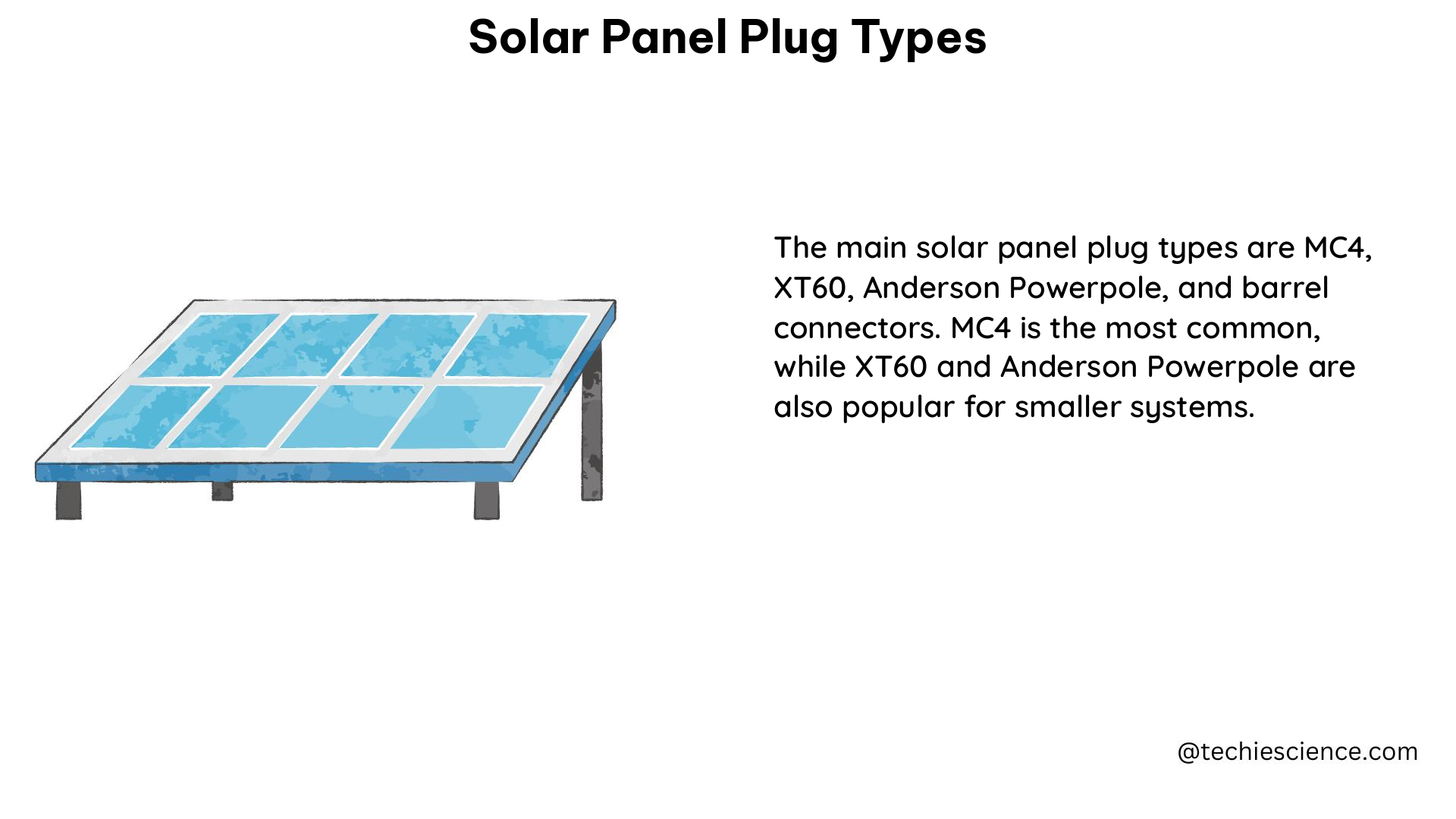Solar panel plug types, also known as connectors, are the essential components that enable the seamless integration and operation of photovoltaic (PV) systems. These connectors play a crucial role in ensuring the electrical efficiency, safety, and reliability of solar installations, from small-scale residential setups to large-scale commercial and utility-scale projects.
Understanding the Common Solar Panel Plug Types
- Universal Solar Connectors:
- These are the industry-standard connectors, featuring multiple contacts and a contact pin diameter of 4mm.
- They are designed to be weatherproof, UV-resistant, and capable of withstanding harsh environmental conditions.
-
Universal solar connectors are known for their versatility, allowing for easy installation, replacement, and maintenance of PV panels.
-
MC3 Connectors:
- MC3 connectors have a cable cross-section ranging from 2.5 to 10 mm².
- They are widely used in solar installations due to their reliable performance and compatibility with a variety of solar panel models.
-
MC3 connectors are known for their secure locking mechanism, ensuring a tight and secure connection between solar panels and other system components.
-
T4 Connectors:
- T4 connectors have a cable cross-section of 2.5 to 6 mm².
- Similar to MC3 connectors, T4 connectors are also commonly used in solar installations, providing a reliable and durable connection solution.
-
These connectors are designed to withstand the harsh environmental conditions often encountered in solar power systems.
-
Tyco Connectors:
- Tyco connectors have a cable cross-section of 4 mm².
- They are renowned for their exceptional durability and reliability, making them a popular choice for solar installations.
-
Tyco connectors are known for their ability to maintain a secure and stable connection, even in challenging environmental conditions.
-
Radox Connectors:
- Radox connectors are designed for high-current applications, with a cable cross-section of 4 mm².
- These connectors are specifically engineered to handle the increased current demands of larger solar power systems.
- Radox connectors are known for their robust construction and ability to maintain optimal performance under high-load conditions.
Technical Specifications of Solar Panel Connectors

When selecting the appropriate solar panel connectors for your PV system, it is crucial to consider the following technical specifications:
| Specification | Description |
|---|---|
| Maximum Current Rating | The maximum current (in amps) that the connector can safely handle. This value should exceed the maximum current generated by your PV array to prevent overheating or power loss. |
| Maximum Voltage Rating | The maximum voltage (in volts) that the connector can withstand. This rating should be higher than the voltage of your solar array to avoid any electrical issues. |
| Ingress Protection (IP) Rating | The connector’s resistance against dust, water, and other environmental factors. A higher IP rating indicates a higher level of protection. |
| Contact Material | The conductive material used for the connector’s contacts, typically copper or silver, to ensure low electrical resistance and optimal energy transfer. |
| Operating Temperature Range | The range of temperatures (in degrees Celsius) within which the connector can operate safely, allowing the PV system to withstand conditions like direct sunlight and freezing temperatures. |
| Safety Mechanism | The locking or securing mechanism that prevents accidental disconnection, ensuring a secure and reliable connection. |
| Safety Class | The level of safety and protection provided by the connector, as defined by industry standards and regulations. |
| Locking/Unlocking Tool | The specialized tool required to properly lock and unlock the connector, ensuring a secure and safe connection. |
| Cable Cross-Section | The diameter (in mm²) of the cable that the connector is designed to accommodate, ensuring a proper fit and electrical performance. |
Choosing the Right Solar Panel Connectors
When selecting solar panel connectors for your PV system, it is essential to consider the specific requirements of your installation, including the system’s voltage, current, and environmental conditions. Carefully matching the connector’s technical specifications to the needs of your solar array will ensure optimal performance, safety, and longevity of your solar power system.
Conclusion
Solar panel connectors are the unsung heroes of the photovoltaic industry, playing a vital role in the efficient and reliable operation of solar power systems. By understanding the various types of solar panel plug types and their technical specifications, you can make informed decisions to ensure the success and longevity of your solar installation.
References:
- Calculations for a Grid-Connected Solar Energy System
- PV Connectors: Sandia Energy
- What are the Different Types of Solar Panel Connectors?

The lambdageeks.com Core SME Team is a group of experienced subject matter experts from diverse scientific and technical fields including Physics, Chemistry, Technology,Electronics & Electrical Engineering, Automotive, Mechanical Engineering. Our team collaborates to create high-quality, well-researched articles on a wide range of science and technology topics for the lambdageeks.com website.
All Our Senior SME are having more than 7 Years of experience in the respective fields . They are either Working Industry Professionals or assocaited With different Universities. Refer Our Authors Page to get to know About our Core SMEs.